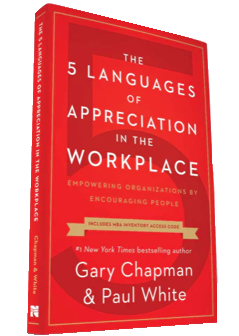The 5 Languages of Appreciation in the Workplace, is based on the book by Gary Chapman and Paul White, it outlines different ways people feel valued and appreciated in professional settings.
These languages reflect diverse preferences for recognition:
- Words of Affirmation: Individuals who respond to this language appreciate verbal praise, acknowledgment, and positive feedback. Simple affirmations, recognition of achievements, and expressions of gratitude are essential for them.
- Acts of Service: Some employees feel valued when their colleagues or supervisors show support by helping with tasks, providing assistance, or making their workload more manageable. Actions that lighten their load or demonstrate teamwork resonate with them.
- Quality Time: This language emphasizes personal interaction. Employees who value quality time appreciate having meaningful conversations, focused attention, and engaged discussions with their peers or superiors. They feel appreciated when others take time to listen and understand their thoughts.
- Tangible Gifts: These individuals feel recognized through physical tokens of appreciation, such as gifts, gift cards, or tokens of gratitude. The thoughtfulness behind the gift shows that their efforts are noticed and valued.
- Physical Touch: While not suitable for all workplace cultures, some individuals feel appreciated through appropriate physical touch, such as a handshake, high-five, or pat on the back. This language conveys warmth and camaraderie.
Understanding and implementing these languages in the workplace can enhance relationships, improve team dynamics, and boost overall morale by tailoring appreciation to each person's unique preferences.

A logical fallacy is an error in reasoning based on a mistaken belief or false idea usually with the intent of shifting the focus away from the primary issue. Logical fallacies weaken arguments, inhibit discussion, and misrepresent ideas. The ability to identify and avoid using logical fallacies yourself as well as counter those used by other people helps to keep discussions focused and limits the introduction of extraneous or unrelated topics. As an educational leader, you interact with people numerous ways; being aware of the pitfalls of engaging in logical fallacies and being able to avoid them will help ensure your interactions are fair, rational, and objective.
This recorded webinar discusses time management skill areas, based on the Time Mastery Profile® to help with creating a plan for managing your time and priorities more effectively. The presenter addresses challenges of managing time, analyzing how much time is truly available, tackling SMART goals to prioritize time management skill development and individual action planning, as well as discusses delegation and use of apps as time management tools.
Explore the basic principles at the foundation of retention, including understanding why employees stay and learning the major drivers of turnover. By understanding what drives motivation, how to build a healthy team, invest in the team, and hire for motivational fit you can motivate and retain employees. Includes networking and resources for identifying and finding the right person for the job.